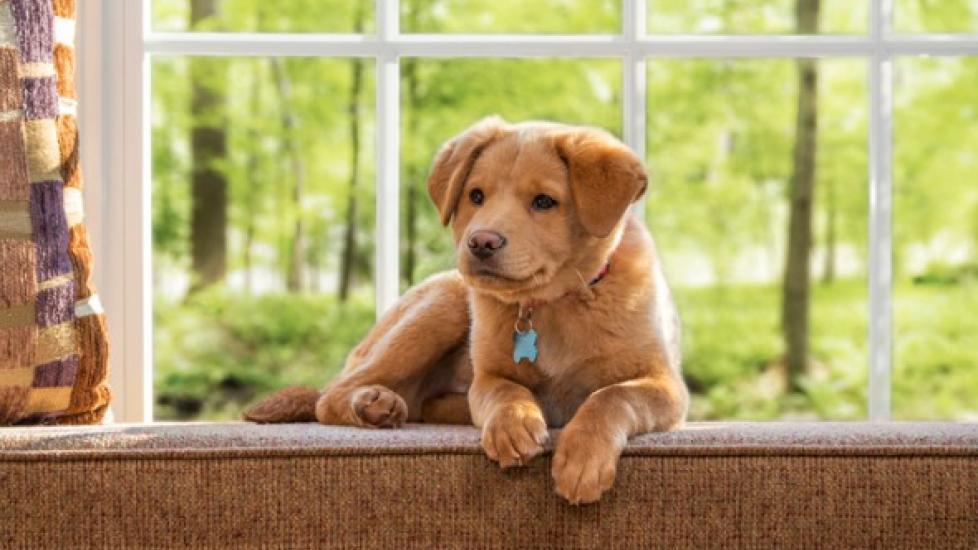Puppy-Proofing Checklist
Reviewed for accuracy on April 9, 2019, by Dr. Katie Grzyb, DVM
Prior to bringing home a new puppy, you are going to want to make sure that your house is puppy-proof. Puppy-proofing your house before your bundle of joy comes home is important because it can prevent them from sniffing out a whole bunch of trouble.
You can start puppy-proofing a house by walking around your entire home and yard and imagining what a puppy could eat, climb or pull down. Then put away or secure those things.
Don’t forget to get down on your knees so you can see your home from your puppy’s perspective, which might help you discover hidden dangers. And remember, anything you’d take away from a toddler, you should keep out of reach from your new puppy, too.
Trash
Hide your trash cans and diaper pails in closets or get securely locking lids. Also watch out for any trash or recycling that might be strewn around the house, such as aluminum foil, plastic wrap, cans with sharp edges, and even plastic canisters—which puppies can get their heads caught in.
Trash cans also contain plenty of food hazards for curious puppies. Raisins, grapes, onions, garlic, chocolate and other items that puppies might find in the garbage can be toxic to dogs. You should also make sure all food is stored in cupboards and not out on kitchen counters.
Electrical
Invest in covers for your outlets—puppies can lick these and end up seriously hurting themselves. You should also get covers to secure wires and strands of lights, especially around the holidays. Puppies are known for chewing, so you will want to puppy-proof the wires in your home before your puppy can get their teeth near them.
Furniture and Decor
Secure lamps, bookshelves and decorations that a puppy can pull or knock down. Move any open storage containers—like baskets and crates full of craft supplies, coins, shoes or toys—to a closed closet or up on a high shelf.
Window Treatments
When puppy-proofing a house, you will also need to think of more obscure risks, like your curtains. Low-hanging curtains can become a chewing target that puppies can pull on and potentially rip off the wall, so make sure they are tied up or pulled to the side and out of reach.
The cords for lifting and lowering your curtains can also be potential risks for your puppy. They may try to chew the plastic or get tangled in the strings, which could lead to strangulation.
Indoor Plants
While it is always nice to have some greenery in your home, you will need to consider which plants are safe for puppies. Some plants are toxic for pets and can lead to serious health issues that require a veterinary visit.
No matter which plants you choose, to fully puppy-proof a house, you will need to keep them out of reach of your puppy. This will prevent them from chewing the plant or digging in the dirt.
Medication
Puppies have no problem chewing up childproof lids and ingesting what’s inside. Move all human medications, prescription pet medication and toiletries out of reach.
Bathroom
Hygiene items found in bathroom trash cans be a hazard for puppies, so opt for a can with a locking lid. Also be sure to keep toilet bowls closed to prevent puppies from drinking from them, as this poses health risks.
Cleaning Supplies
Drain cleaners can be deadly if swallowed, and many other household cleaners are toxic. Secure all of your cleaning supplies in cabinets and get cabinet locks if needed! Do so even if you use products that are labeled as having natural ingredients, as this doesn’t mean they are safe for pets.
Cat Supplies
Make sure that your cat’s bowl, cat food and cat litter box are out of reach. Most dogs can’t resist sampling cat droppings, which can lead to parasite transmission or intestinal obstructions from ingesting the cat litter.
Garage/Yard Supplies
Antifreeze can be fatal, so lock it up and clean up spills using a clay-based litter or by hosing the area down thoroughly. Any liquid you keep in the garage, whether it’s fuel or a household cleaner, is probably toxic to dogs (and cats).
Bug sprays, rat poison and herbicides might be fatal if consumed. Don’t use them unless absolutely necessary.
Make sure heavy tools are secure and that small tools like screws and nails are stored high off the ground.
Most importantly, puppies could run though closing garage doors or sleep under parked cars. Always check before operating either machine.
Outside
While you should always supervise your puppy, it’s important to look for weak spots in your fence and make sure your pool is secured. Drowning is a possibility, even if your puppy can swim. And you’d be surprised how little space they need to crawl out of a secure yard!
Featured Image: iStock.com/Janine Lamontagne
